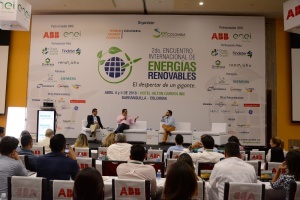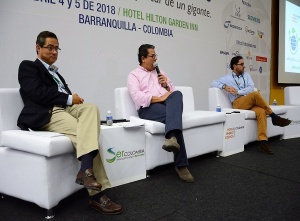Regulatory advances for the use of non-conventional renewable energy sources (FNCER) and their integration into the country's electricity system was high on the agenda. The challeneges of diversifying and complementing Colombia's energy basket was also discussed. It was agreed that technologies, such as non-conventional renewables, should be incorporated into Colombia's energy mix, guaranteeing security of supply, and making the population's access to modern energy service more accessible. A presentation of experiences and practices in countries within the region that have already held their first auctions to incorporate this type of sources in their energy baskets was also given.
Institutionality: managing climate risk
Germán Arce, Minister of Mines and Energy, highlighted the fact that the Colombian energy basket, mostly hydroelectric, is very vulnerable to extreme weather events such as the 'El Niño phenomenon', which are becoming increasingly frequent and severe, altering the country's hydrological cycles. He questioned how to best manage this risk in order to achieve a better energy performance of the country incorpoating all possible sceanrios.
During the 'Regional Experiences in the Implementation of Mechanisms of Expansion of Generation with Non-Conventional Renewable Sources' panel, the Vice -Minister of energy recognised the successful experiences of the integration of non-conventional renewable energies in other countries, such as solar or wind. He emphasised the model to be implemented should be unique, consider the complex nature of Colombia, and above all, guarantee better energy prices for the consumer and the participation of more players in the energy market.
For the Executive Director of the Energy and Gas Regulation Commission (Creg), existing public policies contain the "necessary ingredients" for agents within the sector to venture investments in non-conventional renewable energies, without losing sight of the need to always guarantee the reliability of the system. Furthermore, he stated the most important objective is to achieve economic efficiency. Colombia distinguishes itself from other countries in the region in which sector institutions and agents rely extensively on market solutions, he concluded.
In relation to the elimination of barriers to the integration of the Fuentes No Convencionales de Energía Renovable (FNCR), into the energy system, the Superintendency of Residential Public Services highlighted the advances of sensitive issues such as efficient measurement, self-generation and the management of surplus energy.
Policy framework and regulation
The participants at the meeting explored a number of policies recently introduced:
-
Law 1715 of 2014 was issued To promote the development and use of unconventional sources of energy, mainly renewables, in the national energy system. Subsequent developments of the law such as resolution 030 of 2018, regulates small-scale self-generation and the distributed generation in the SIN, the National Interconnected System, with non-conventional renewable resources. This resolution empowers the user to produce energy for their supply.
-
Resolution MME 40072 of 2018 provides mechanisms to implement smart metering.
-
Decree 570 dated March 23, 2018 presents the public policy guidelines in relation to a mechanism to make viable generation projects: long-term contracts. This mechanism favors the participation of other unconventional resources in the energy basket and necessarily, will result in an expansion of the market introducing important changes in market management and in and in particular, in the management of transmission and distribution networks. The incorporation in the application of the tariff methodology will correspond to the Energy and Gas Regulation Commission (CREG), before 31 July and the auction to the UPME.
Convergences and divergences
However, the publication of this decree has been received, with some apprehension by some industry figures within the sector, insisting that any defined scheme should allow all the technologies to compete under the same conditions and avoid cross subsidies between the demand, the users and the generators. There is also concern about the possible detriment of their previous investments to the fixing of the long-term mechanism, due to the lower requirements of firm energy in the country.
"The fact that some of these investments have been made on assumptions of increase in the firm energy requirements of the system, which have not materialised, can not be to the detriment of the entry of new players and new resources to the system. They contribute different qualities to the firm energy with stable prices and much less against new options of long-term contracting with competitive prices in benefit of the national energy demand."
The Association of Renewable Energies, SER, recognises that there are already some definitive rules, including the ceiling formula for the calculation of the charge for support, and definitions that unlock the structuring and closing of this type of projects. The generators that currently participate in the contract market will continue to bid as they do today, said Alejandro Lucio, Executive Director of SER.







